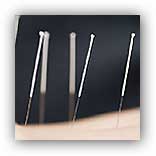News and Insights for
your best life. Online since 1998
- Home Health
- Breaking news
- In caso di...
- Per saperne di
più... - Medicina occidentale
- Medicine complementari
- Medicina cinese
e agopuntura - Omeopatia
- Fitoterapia

Depression is a significant cause of morbidity. Many patients have communicated an interest in non-pharmacological therapies to their general practitioners. Systematic reviews of acupuncture and counselling for depression in primary care have identified limited evidence. The aim of this study was to evaluate acupuncture versus usual care and counselling versus usual care for patients who continue to experience depression in primary care.

Unfortunately, antidepressants don't work for more than half of patients. Moreover, many patients would like to be offered non-pharmacological treatment options for depression such as acupuncture and counseling, a “talking therapy” that provides patients with a safe, non-judgmental place to express feelings and emotions and that helps them recognize their capacity for growth and fulfillment.
However, it is unclear whether either of these treatments is effective in depression. In this pragmatic randomized controlled trial, the researchers investigate the clinical effectiveness of acupuncture or counseling in patients with depression compared to usual care in primary care in northern England.
A randomized controlled trial compares outcomes in groups of patients who are assigned to different interventions through the play of chance. A pragmatic trial asks whether the intervention works under real-life conditions. Patient selection reflects routine practice and some aspects of the intervention are left to the discretion of clinician, By contrast, an explanatory trial asks whether an intervention works under ideal conditions and involves a strict protocol for patient selection and treatment.
The researchers recruited 755 patients who had consulted their primary health care provider about depression within the past 5 years and who had a score of more than 20 on the BDI-II–a score that is defined as moderate-to-severe depression on this depression rating scale–at the start of the study.
Patients were randomized to receive up to 12 weekly sessions of acupuncture plus usual care (302 patients), up to 12 weekly sessions of counseling plus usual care (302 patients), or usual care alone (151 patients).
Both the acupuncture protocol and the counseling protocols allowed for some individualization of treatment.
Usual care, including antidepressants, was available according to need and monitored in all three groups.
Compared to usual care alone, there was a significant reduction (a reduction unlikely to have occurred by chance) in the average PHQ-9 scores at both 3 and 6 months for both the acupuncture and counseling interventions.
The difference between the mean PHQ-9 score for acupuncture and counseling was not significant.
At 9 months and 12 months, because of improvements in the PHQ-9 scores in the usual care group, acupuncture and counseling were no longer significantly better than usual care.
These findings suggest that, compared to usual care alone, both acupuncture and counseling when provided alongside usual care provided significant benefits at 3 months in primary care to patients with recurring depression. Because this trial was a pragmatic trial, these findings cannot indicate which aspects of acupuncture and counseling are likely to be most or least beneficial. Nevertheless they do provide an estimate of the overall effects of these complex interventions, an estimate that is of most interest to patients, practitioners, and health care providers. Moreover, because this trial only considers the effect of these interventions on patients with moderate-to-severe depression as classified by the BDI-II; it provides no information about the effectiveness of acupuncture or counseling compared to usual care for patients with mild depression. Importantly, however, these findings suggest that further research into optimal treatment regimens for the treatment of depression with acupuncture and counseling is merited.
For more information
MacPherson H, Richmond S, Bland M, Brealey S, Gabe R, et al. (2013) Acupuncture and Counselling for Depression in Primary Care: A Randomised Controlled Trial. PLoS Med 10(9): e1001518. doi:10.1371/journal.pmed.1001518
MDN
del Dott. Turetta
Quali sono i problemi o le disfunzioni che possono giovarsi di un intervento omeopatico d'urgenza e, di conseguenza, come dovrebbe essere un ideale armadietto medicinale omeopatico casalingo.- Home -
- Health -
- Depressione -
- Sexuality
- Environment -
- Food -
- Musica -
- Capirsi -
- Grafologia -
- Ridere
Copyright © 1998/2018 www.mybestlife.com tutti i diritti sono riservati eccetto quelli già di altri proprietari.
.In caso di
Pubblicità
Per saperne di più su
Pubblicità
Pubblicità
Pubblicità
Pubblicità


